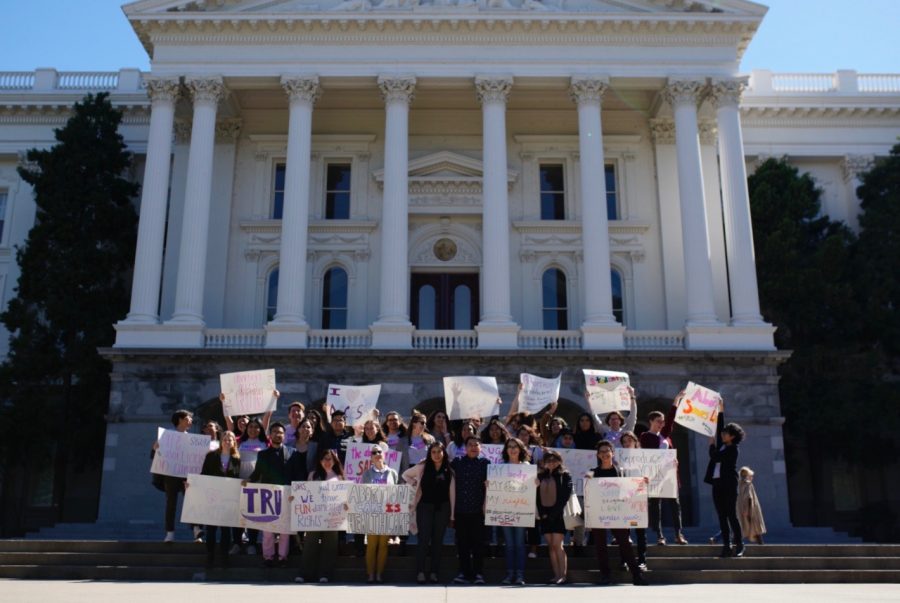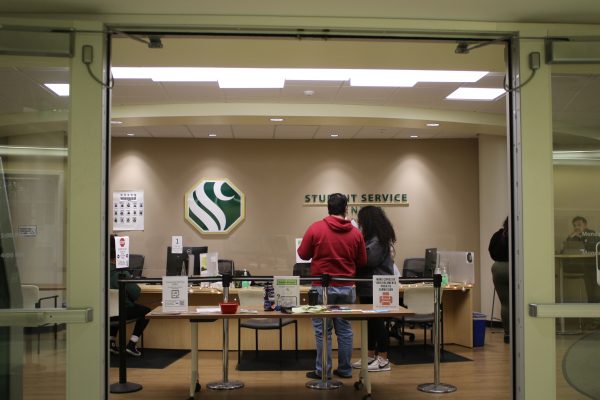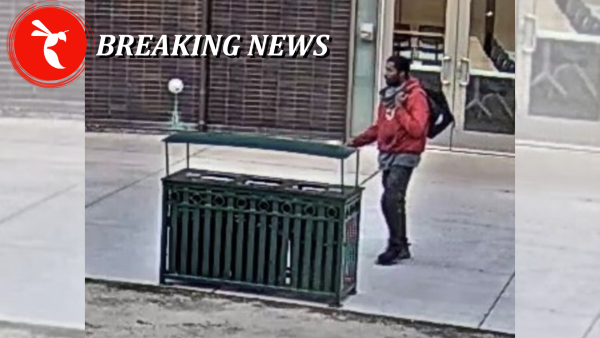New bill may provide medical abortion on CSU and UC campuses
Photo courtesy of justCARE.
CSU and UC students gather at the Capitol to advocate for Senate Bill 24 and women’s reproductive health on March 11. A new bill may allow for medication abortion to be provided by public California universities.
March 26, 2019
Students from public California universities like Sacramento State are advocating for women’s reproductive services — including medication abortion — to be available at campus student health centers.
On March 11, justCARE: Campus Action for Reproductive Equity brought together 40 students from different campuses at the state Capitol to sit-in meetings with senators and advocate for Senate Bill 24 or the “College Student Right To Access Act.” The students split up into groups, in a total of 32 offices.
“We want students to be able to directly advocate for SB 24 with their senators,” said Dey Nava, justCARE campaign manager.
SB 24, introduced by Senator Connie Leyva, would require all CSU and UC campuses to offer medication abortion after January 1, 2023.
RELATED: New campus medication abortion bill introduced
According to the Food and Drug Administration, medication abortion or the abortion pill, is considered to be “a safe and effective way to end an early pregnancy.”
The FDA found this method of abortion safe and effective up to the first 10 weeks of pregnancy. The medication abortion works by blocking progesterone needed for a pregnancy to continue and causing uterine contractions to then induce an abortion.
Sac State student Sloane Vanciel said that the process of abortion is hard for a lot of students and providing the pill on campus would simplify it for them.
“Students are going to seek this out and they’re not going to be able to go to their classes,” Vanciel said.
Vanciel said she believes arguing whether abortion services are right or wrong will not help students but make it more challenging when seeking services.
RELATED: Letter to the editor: Sac State needs to provide access to medical abortions
According to a study released in December 2017 by UC San Francisco, an estimated 1,038 students in both the CSU and UC campuses obtain abortions each month.
Students who seek abortion services are met with other circumstances such as travel costs and time away from other obligation such as class and work, according to the study.
“I think this would benefit students tremendously across the state,” said Nava. “Every day students face all kinds of barriers in seeking abortion and this would really help removing the barriers in accessing abortion by having it (at) their student health center.”
If passed, SB 24 would require the California Commission of the Status of Women and Girls to fund the College Student Health Center Sexual and Reproductive Health preparation fund with grants of $200,000 per public university.
The money would be used for direct or indirect “medication abortion readiness, including training medical staff, supply equipment and teaching medical techniques to provide abortions in health care center and new facilities if needed.”
Private donors will also be providing additional funding costs aside from the grants provided to campus health centers.
“Most people we talked to were in support of this bill, so I do see it going through and happening and making a big difference in the life of college students because this is an essential healthcare need,” Vanciel said.
According to Nava, schools such as University of California, Irvine are installing vending machines that will provide Plan B, pads and tampons on campus.
RELATED: Birth control vending machines coming to campus
Other universities have students handing out menstrual products to those who don’t have access to them or can not afford them.
RELATED: Sac State students supply free menstrual products on campus
Nava said that justCARE will continue its efforts to spread knowledge and advocate for reproductive rights and is proud of all the work students are doing to lift barriers connected with a range of women’s reproductive health issues.
“So our campaign is about SB 24 but it’s also ensuring that students have access to campus and are able to advocate for any reproductive health rights issues. We would be making history if this bill passes.”
The bill has its next hearing in the state Senate Health committee scheduled on April 3.





































































































































Orlando Women's Clinic • Oct 10, 2019 at 1:12 am
Thanks for sharing the post.
Abortion pill or in clinic